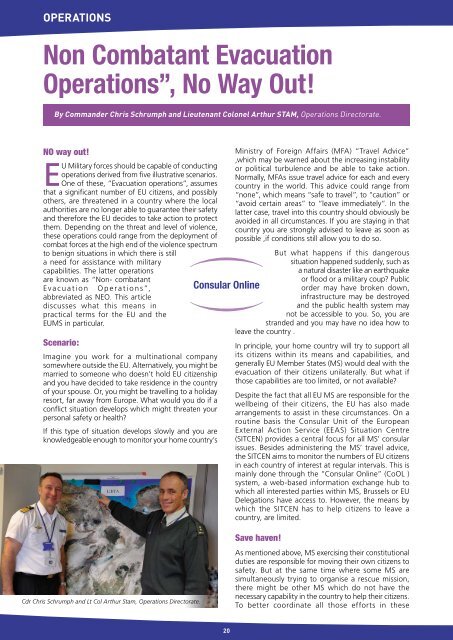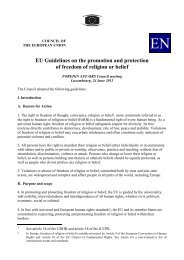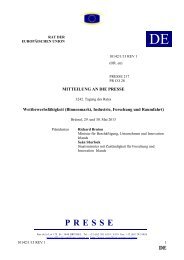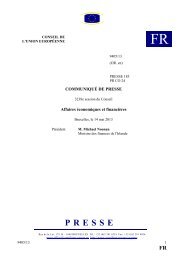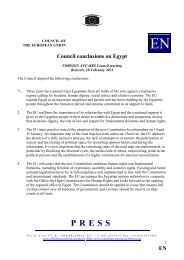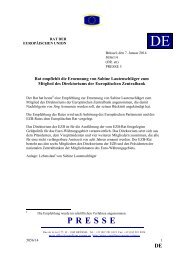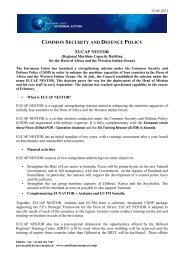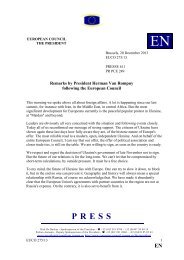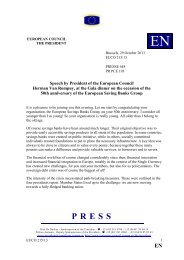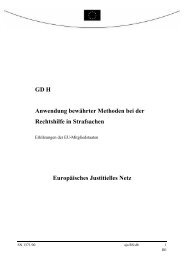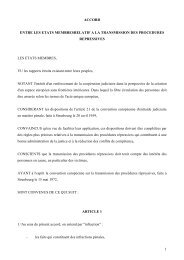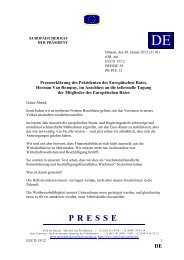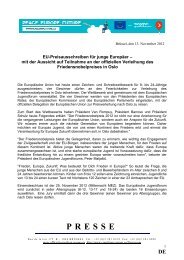Impetus - Europa
Impetus - Europa
Impetus - Europa
Create successful ePaper yourself
Turn your PDF publications into a flip-book with our unique Google optimized e-Paper software.
OPERATIONS<br />
Non Combatant Evacuation<br />
Operations”, No Way Out!<br />
By Commander Chris Schrumph and Lieutenant Colonel Arthur STAM, Operations Directorate.<br />
NO way out!<br />
EU Military forces should be capable of conducting<br />
operations derived from five illustrative scenarios.<br />
One of these, “Evacuation operations”, assumes<br />
that a significant number of EU citizens, and possibly<br />
others, are threatened in a country where the local<br />
authorities are no longer able to guarantee their safety<br />
and therefore the EU decides to take action to protect<br />
them. Depending on the threat and level of violence,<br />
these operations could range from the deployment of<br />
combat forces at the high end of the violence spectrum<br />
to benign situations in which there is still<br />
a need for assistance with military<br />
capabilities. The latter operations<br />
are known as “Non- combatant<br />
Evacuation Operations”,<br />
abbreviated as NEO. This article<br />
discusses what this means in<br />
practical terms for the EU and the<br />
EUMS in particular.<br />
Scenario:<br />
Imagine you work for a multinational company<br />
somewhere outside the EU. Alternatively, you might be<br />
married to someone who doesn’t hold EU citizenship<br />
and you have decided to take residence in the country<br />
of your spouse. Or, you might be travelling to a holiday<br />
resort, far away from Europe. What would you do if a<br />
conflict situation develops which might threaten your<br />
personal safety or health?<br />
If this type of situation develops slowly and you are<br />
knowledgeable enough to monitor your home country’s<br />
Cdr Chris Schrumph and Lt Col Arthur Stam, Operations Directorate.<br />
Consular Online<br />
20<br />
Ministry of Foreign Affairs (MFA) “Travel Advice”<br />
,which may be warned about the increasing instability<br />
or political turbulence and be able to take action.<br />
Normally, MFAs issue travel advice for each and every<br />
country in the world. This advice could range from<br />
“none”, which means “safe to travel”, to “caution” or<br />
“avoid certain areas” to “leave immediately”. In the<br />
latter case, travel into this country should obviously be<br />
avoided in all circumstances. If you are staying in that<br />
country you are strongly advised to leave as soon as<br />
possible ,if conditions still allow you to do so.<br />
But what happens if this dangerous<br />
situation happened suddenly, such as<br />
a natural disaster like an earthquake<br />
or flood or a military coup? Public<br />
order may have broken down,<br />
infrastructure may be destroyed<br />
and the public health system may<br />
not be accessible to you. So, you are<br />
stranded and you may have no idea how to<br />
leave the country .<br />
In principle, your home country will try to support all<br />
its citizens within its means and capabilities, and<br />
generally EU Member States (MS) would deal with the<br />
evacuation of their citizens unilaterally. But what if<br />
those capabilities are too limited, or not available?<br />
Despite the fact that all EU MS are responsible for the<br />
wellbeing of their citizens, the EU has also made<br />
arrangements to assist in these circumstances. On a<br />
routine basis the Consular Unit of the European<br />
External Action Service (EEAS) Situation Centre<br />
(SITCEN) provides a central focus for all MS’ consular<br />
issues. Besides administering the MS’ travel advice,<br />
the SITCEN aims to monitor the numbers of EU citizens<br />
in each country of interest at regular intervals. This is<br />
mainly done through the “Consular Online” (CoOL )<br />
system, a web-based information exchange hub to<br />
which all interested parties within MS, Brussels or EU<br />
Delegations have access to. However, the means by<br />
which the SITCEN has to help citizens to leave a<br />
country, are limited.<br />
Save haven!<br />
As mentioned above, MS exercising their constitutional<br />
duties are responsible for moving their own citizens to<br />
safety. But at the same time where some MS are<br />
simultaneously trying to organise a rescue mission,<br />
there might be other MS which do not have the<br />
necessary capability in the country to help their citizens.<br />
To better coordinate all those efforts in these


